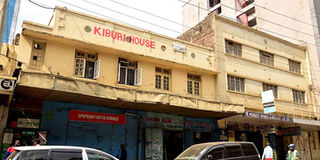Iconic house that freedom fighters turned into office

Kiburi House on Kirinyaga Road in Nairobi on September 6, 2019. It was the first building to be owned an African. PHOTO | SALATON NJAU | NATION MEDIA GROUP
What you need to know:
- In 1950, Richard Macharia offered a room in the building to the Kenya African Union, which became its Nairobi branch office.
- The Mau Mau did not take kindly to the call for its demise. Kenyatta was summoned to Kiburi House and warned against criticising the militant group.
Kirinyaga Road is the vehicle spare-parts hub of Nairobi.
But not many people know that nestled on this road is the most important building in the country’s fight for independence.
Kenya Fuel and Bark Supplying Company Ltd bought the one-storey building for Sh8,000 in 1948 and named it after the founding chairman, Kiburi wa Thumbi.
In a 1971 issue of DRUM magazine, the late nationalist Bildad Kaggia said Kiburi House spelled “dread and fear for the colonial authorities”.
Founded on May 2, 1946, Kenya Fuel and Bark was one of the first limited liability firms owned by indigenous Kenyans.
Prominent shareholders include Kenya’s first president Jomo Kenyatta, Wahu Kenyatta, Peter Muigai Kenyatta and Uhuru Kenyatta, listed as a transferee in his youth.
Kaggia wrote that in 1950, their managing director, Richard Macharia, offered a room in the building to the Kenya African Union (Kau), which became its Nairobi branch office.
MAU MAU
The Transport and Allied Workers Union soon moved into the building. This transformed it into a hub of trade union and political activity.
It also became a meeting place for prominent Africans visiting Nairobi. A female trade unionist saw an opportunity and opened a food kiosk in the house.
The building also became the centre of the Mau Mau movement. As Kaggia documented, Kau meetings took place in the building.
Kau leaders also planned to administer oaths in the house. Meetings of the Mau Mau War Council also took place here.
According to reports, on July 26, 1952, at a Kau gathering of over 50,000 people in Nyeri, Jomo Kenyatta publicly denounced Mau Mau and its activities.
His statement was directed against the radical nature of the Mau Mau and his worry that it threatened the democracy that KAU was working towards.
“Mau Mau has spoiled the country. Let Mau Mau perish forever. All people should search for Mau Mau and kill it,” he is quoted as saying.
MEDIA
The Mau Mau did not take kindly to the call for its demise. Kenyatta was summoned to Kiburi House and warned against criticising the militant group.
The media was instrumental in spreading information on Kau’s activities.
Vernacular newspapers grew in popularity as reliable sources of news for Africans. Kiburi House was the publishing centre for Wiyathi, Inooro ria Gikuyu and Afrika Mpya newspapers.
Representatives of Western media at first shunned Kau but later got interested in its activities and subsequently went to the building for interviews with some party leaders.
Kiburi House also houses two safety deposit boxes. The large steel boxes are built into the building’s walls.
In 2006, burglars broke into one of them and stole a few old coins. The other box is located in a restaurant within Kiburi House. It is blocked and its content is a mystery.
Is there a site you want us to feature? Write an e-mail to [email protected]




